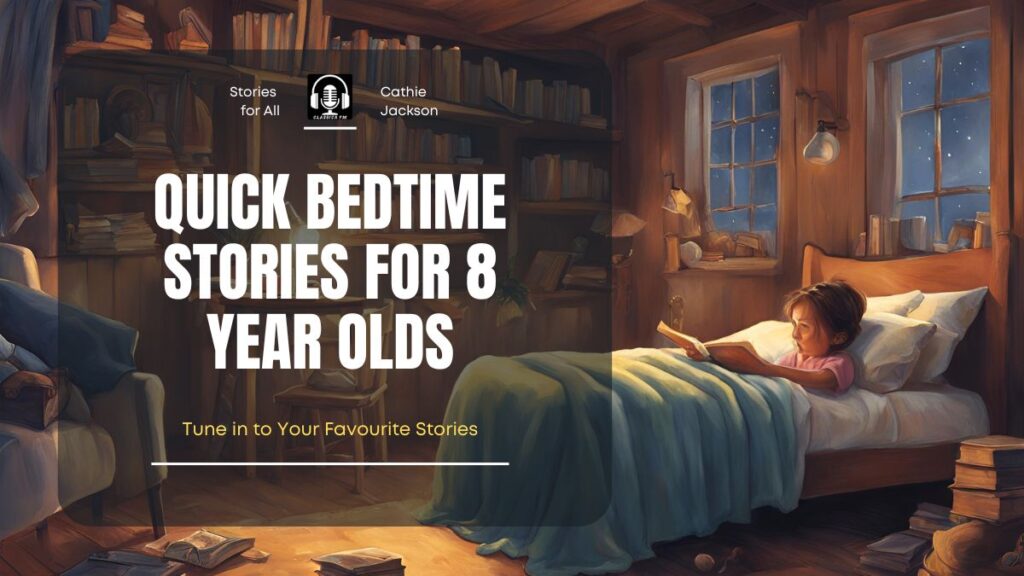There’s something really soft and special about ending the day with a story. Not just any story—but one made just for the two of you.
You’re wrapped up in a blanket, the room is quiet, maybe there’s a candle flickering somewhere. And then you begin.
It’s not about being a great storyteller. It’s about sharing something sweet. Taking a few minutes to drift into a gentle, made-up world where she’s the princess—and you’re the one creating the magic.
That’s the heart of princess bedtime stories for girlfriend—simple, dreamy tales told with love. Stories that say, “I see you,” without needing anything fancy.
This guide isn’t complicated. It’s just here to help you make that moment feel cozy, fun, and full of love.
Princess Bedtime Stories for Girlfriend
Looking for a sweet way to end the day? Princess bedtime stories for your girlfriend turn quiet nights into magical moments—where she’s the princess, and your voice is the fairytale. Cozy, simple, and made just for her.
The Princess Who Spoke to Stars

Elara couldn’t sleep.
Not really. Not when her thoughts spun like the gears of a clock. Not when the palace halls felt like a cage draped in silk.
She would toss and turn under thick covers, pillows fluffed by royal hands, curtains drawn to keep out even the smallest moonbeam. Still, her heart would thump like a wild drum, restless and unsure.
So, most nights, she got up.
Barefoot, careful, she’d grab her blanket—blue with stitched suns and curling vines—and tiptoe through the sleeping halls. Past her governess’s quarters. Past portraits of kings and queens with tight smiles and watchful eyes. Up the spiral stairs of the tallest tower.
It was her spot.
No guards. No whispers. Just wind, stone, and sky.
The view from the tower stretched far. She could see the dark curves of the fields, the glowing river like a sleeping snake, and beyond that—just stars. Thousands. Millions.
She talked to them.
At first, she whispered little things. Silly things.
“Today I dropped my fork and the Duchess acted like I’d set the table on fire.”
Or, “The new tutor smells like onions and misery.”
But slowly, as the stars blinked quietly above, she began to share more.
“I don’t think I want to marry a prince.”
“I’m tired of being watched all the time.”
“Sometimes I don’t even know who I am when I’m not being… perfect.”
The stars listened. Or at least, it felt like they did.
There was one star she liked most.
It was small. Tucked away just above the northern tree line. It twinkled more than the others. Like it was always laughing or trying to get her attention.
She called it “Starling.”
One night, when the palace was especially heavy and everyone had spent the entire day rehearsing a formal greeting for visiting nobles, Elara whispered something she hadn’t said aloud before.
“I wonder if there’s more than this,” she said. “More than rules and gowns and being perfect all the time.”
And Starling blinked.
Once.
Then again.
It was small, but unmistakable.
She sat up straighter, heart racing.
“Elara,” she whispered to herself, “you’re not dreaming, right?”
But the star blinked again. Soft. Steady.
Something inside her stirred. A feeling like warm wind or the first drop of rain.
She didn’t think. She just moved.
Down the tower. Out the door. Past the rose arch and beyond the orchard, into the soft fields behind the palace.
The grass was cool. Dewy. She moved quickly, guided only by moonlight—and that blinking star.
It led her, somehow. Not with words. Not with light beams. Just… a pull. A knowing.
And then she saw it.
In the center of the field, there was a small stone. Smooth. Round. Nestled in the grass like it had always belonged there.
She knelt.
Touched it.
It was warm.
Not like a stone left in the sun. No. Warm like someone had been holding it. Like it had a heartbeat.
She picked it up, pressed it to her chest, and closed her eyes.
“Thank you for hearing me,” she whispered.
The wind shifted.
Somewhere nearby, a nightbird sang.
She stayed there for a while, blanket around her shoulders, stone in her hand. She didn’t need answers. Not tonight. Just that moment.
From then on, Starling blinked every night.
Even when it rained.
Even when the skies were filled with clouds, she’d find her way to the tower, and somehow, some part of that little star would find her.
She started keeping a journal.
It was plain—hidden beneath layers of old books in the back of her shelf.
In it, she wrote everything she never got to say.
“I like the stable boy’s stories better than the court poet’s.”
“I think my laugh is too loud, but I love it anyway.”
“I want to build something with my hands. Not just wave from balconies.”
Some pages were stained with tears.
Others had doodles—of stars, towers, and dreams.
She began to change.
Nothing dramatic. Nothing people could point to and whisper about in the royal courtyard.
But she started asking questions.
“Why can’t I take a turn in the kitchen?”
“Who decided that princesses don’t get muddy?”
She joined the gardeners one morning, surprising them all, and spent hours digging and planting tulip bulbs.
She learned the names of the palace guards, asked about their families, and remembered the names of their children.
And every night, she returned to the tower.
Some nights, she didn’t speak.
She just looked up, stone in hand, and breathed.
The blinking never stopped.
One winter evening, as snow fell soft and slow outside her window, a knock came at her door.
It was her younger brother.
He looked nervous. Pale.
“Elara,” he said, voice shaking. “Do you… ever feel like there’s something missing? Like we’re all pretending?”
She stared at him, stunned.
Then smiled.
She reached under her pillow and handed him the stone.
“Here,” she said. “You hold it tonight.”
He did.
And the next morning, he returned it. His eyes brighter. Softer.
“I think… it blinked for me too,” he said.
They never spoke of it again. Not in words.
But sometimes, when they passed each other in the halls, they shared a knowing look. A small nod. Like stars passing messages.
Years went by.
The palace changed.
So did Elara.
She started a tradition—each child born in the kingdom received a soft quilt stitched with stars. A reminder to dream. To listen. To wonder.
She eventually became queen.
But she never forgot the tower. Or the stone.
Or Starling.
And when her own daughter couldn’t sleep one night, restless and full of questions, Elara took her hand.
Led her up the winding stairs.
Wrapped her in the old blue blanket.
And pointed to the sky.
“Do you see that one?” she whispered.
The little girl blinked. “The one that twinkles?”
Elara nodded.
“It’s listening.”
The Lantern in the Garden
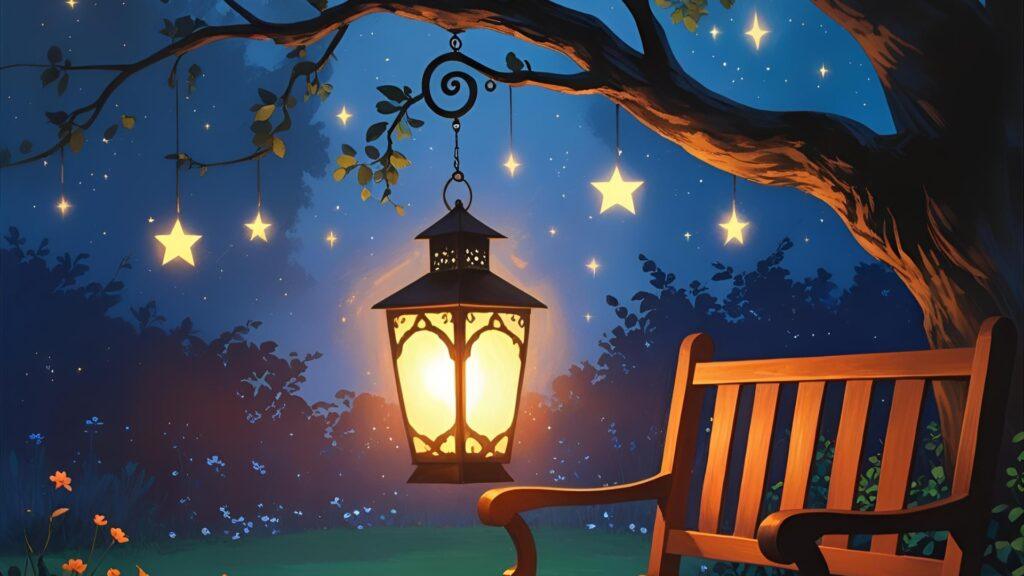
Liora liked quiet places.
Not just silent—but quiet in the way that made her feel calm. Like the hush after a deep breath. Or the sound of leaves shifting just slightly in the wind.
The garden behind the palace was her favorite.
Most people didn’t go there. It wasn’t as grand as the rose courtyard or as polished as the marble terrace. But to Liora, it felt like magic.
Tall trees stood like old friends, their trunks wide and twisted with age. Vines draped like ribbons. Wildflowers grew where they pleased. There were mushrooms that glowed a little after it rained. Bees that moved slow and lazy in the sun.
She’d bring books sometimes. Or nothing at all.
Just herself.
One evening, right as the sky turned lavender, she found something new.
It hung from a low branch of the oldest tree—a rusty, dented lantern.
It looked like it hadn’t been touched in years. The metal was chipped. The glass fogged. But it still swung gently in the breeze, as if it had been waiting for her.
Tied to its handle with a piece of twine was a tiny note.
It read:
“Only lights when love is true.”
She laughed.
A little.
It was silly.
What did that even mean?
Still… something about the lantern made her pause.
She touched it. The metal was cool. The note flapped slightly. She looked around, expecting someone to jump out and say, “Got you!”
No one came.
Just the breeze.
Just the trees.
So, she left it there.
But the next evening, she came back.
She sat under the lantern, cross-legged in the grass, and told it a story.
It was about her cat, Clover, who had once dragged an entire pie off the kitchen counter and buried it in the laundry basket.
The lantern stayed dark.
The night after, she sang to it.
Quiet, awkward humming at first. Then words. Songs she remembered from childhood. Ones her mother used to sing when she brushed her hair.
Still, nothing.
The lantern didn’t even flicker.
She started visiting every evening.
Sometimes she talked.
Sometimes she just sat.
She told the lantern how she hated court dances. How the tight shoes pinched her toes and the music never matched how she felt inside.
She whispered that she didn’t think she was very interesting. That sometimes, when people praised her beauty or her posture, she wanted to scream.
She told it that she once broke a vase and blamed the dog.
That she missed her older brother, who was off learning how to rule some far-off corner of the kingdom.
That she felt lonely, even when surrounded by people.
Still.
The lantern stayed dark.
Weeks passed.
Spring melted into early summer.
The lantern became her secret.
She started bringing it little things—clover chains, poems folded into squares, pieces of ribbon.
She tucked them into its handle or tied them onto the branch.
It never lit.
One day, she was having an awful afternoon.
Someone had criticized the way she curtsied. Again.
She had spilled tea on her gown. Again.
And someone she liked—a boy who smelled like cinnamon and books—had laughed at something someone else said instead of noticing her.
It felt silly. All of it.
She wanted to cry. But princesses didn’t cry. Not in hallways. Not in front of people.
So she ran.
To the garden.
To her tree.
To her lantern.
She dropped to her knees, head bowed.
And for the first time, she didn’t try to charm the lantern.
She didn’t tell it a funny story. She didn’t sing or gift it a flower.
She just let the words spill.
“I love you,” she said softly. Not to the lantern. Not to anyone, really. Just… into the air.
“I love you, and you don’t have to be perfect.”
It came out cracked and tired.
“I don’t think anyone’s perfect,” she whispered. “And I don’t think they should have to be.”
And then, she laughed.
One short, shaky breath of a laugh.
Because what kind of girl tells a rusty lantern she loves it?
But when she looked up—
The lantern glowed.
Just barely.
A soft, golden light shimmered from within, like a candle had lit itself. Not bright. Not flashy. But warm.
Warm in a way that made her chest ache.
She blinked hard.
It stayed lit.
For a moment. Then two.
Then, as if satisfied, it dimmed. Back to rust and quiet.
She didn’t say anything.
Just placed her hand gently on the bark of the tree and sat back.
The next day, she returned.
This time, she didn’t try anything clever.
She simply sat. Hummed a lullaby. Watched the petals fall from the nearby wisteria.
And the lantern lit again.
Softer this time. But steady.
She smiled.
The garden changed after that.
Or maybe she did.
She noticed things more.
The way the ivy curved into the shape of a heart. The squirrel that always returned to the same branch. The little mushroom ring by the tree’s base.
She realized someone had carved initials into the trunk—long ago.
A heart. A name. A second name.
She ran her fingers over the faded shapes.
Maybe someone else had found love here, too.
She started keeping a journal of what she told the lantern.
“I love Clover when she tries to talk to butterflies.”
“I love the way the cook sings when she thinks no one’s listening.”
“I love the boy from the library, even if he doesn’t love me back.”
“I love myself, I think. At least, I’m trying to.”
Some days, the lantern glowed. Some days, it didn’t.
She came anyway.
One stormy night, thunder rumbling and wind tossing branches, she snuck out in her cloak, heart pounding.
She reached the tree, soaked and shaking.
The lantern was still there.
She hugged the trunk.
“I’m here,” she said. “Even when it’s hard. I still love. I still hope.”
And in that downpour, the lantern shone brighter than it ever had.
People started noticing changes in Liora.
She smiled more.
She asked better questions.
She helped the younger children in the palace garden without being asked.
She sang in the halls.
And when someone said her laugh was too loud, she said, “Maybe yours is too quiet.”
No one else knew about the lantern.
But they didn’t have to.
It was hers.
One day, years later, she found another note tied to the handle.
The same handwriting. Same twine.
But a new message.
“Thank you for loving what is real.”
She never knew who wrote the first note. Or the second.
Maybe someone long ago.
Maybe someone watching still.
But she didn’t need answers.
Just the garden. Just the tree.
And a lantern that knew when love was true.
The Princess and the Paper Boat

Every spring, the lake thawed.
The ice melted into ripples, the reeds began to stretch again, and the birds returned with songs like laughter. The sky seemed wider somehow, as if it had been holding its breath all winter and could finally exhale.
That’s when Mira brought out the paper.
Not parchment. Not royal scrolls. Just soft, foldable sheets—sometimes plain, sometimes printed with faded flowers or bits of song lyrics she liked.
She’d sneak them from the writing room when no one was looking. Hide them between the pages of thick palace books. Wait for the right day.
Then, barefoot and wrapped in a shawl, she’d go to the lake.
She sat by the edge, on a flat stone where the earth met the water like a shy greeting.
And she folded.
Little boats.
Some tiny enough to sit on her palm. Others long and narrow, with pointed tips like swans.
Before she set each one afloat, she’d write a wish inside. Not grand wishes. Not royal ones.
Small ones.
Like:
“I hope I laugh for real today.”
or
“I hope someone asks how I’m really doing.”
or
“I hope I find someone who truly sees me.”
Then she’d tuck the paper closed and push the boat into the water.
One by one, they floated.
Carried by the breeze, they’d drift away—some curving gently, some spinning in slow circles.
Most disappeared.
Some got caught in reeds. A few sank before they even made it a foot.
She didn’t mind.
That was part of it.
Letting go.
Sending a piece of her out and not knowing where it would go—or if it would be found at all.
But one day… one came back.
She had just sent off her fifth boat—a pale yellow one with a shaky fold—when she saw it.
A boat.
Not hers.
Drifting toward her from the other side of the lake.
At first, she thought maybe it had just circled back. That the wind had changed.
But when it reached the shore, right at her toes, she picked it up—and her breath caught.
Inside was a tiny note.
In different handwriting.
Just four words.
“I see you, Mira.”
She stared at it for a long time.
The lake shimmered behind her. The trees stood still. The world seemed to pause.
Who…?
She turned slowly, scanning the opposite bank.
There was no one.
Just grasses. Shadows.
But something in her stirred. A kind of trembling curiosity. Not fear—never fear. Just wonder.
She returned the next day.
And the next.
She brought more boats.
But instead of sending them out, she waited.
On the third day, another boat arrived.
Inside:
“I liked your blue boat the most.”
Her heart flipped.
She started writing back.
Short notes. Questions.
“Who are you?”
“Where are you?”
“Why me?”
Each time, she’d fold a boat, write a message, and wait. Sometimes for hours.
And the answers came.
Not every time.
But enough.
The notes weren’t signed. They were careful. Thoughtful.
“I’ve watched you fold boats for years.”
“You look happy when no one’s around.”
“I think you’re brave.”
It became their secret.
No one else knew.
She started folding more boats than ever. Some with notes. Some with doodles. Some just to send something out, hoping he’d find it.
Eventually, she couldn’t wait anymore.
She followed the lake’s edge one morning.
Barefoot, as always.
The air was cool. The light was gold. The ground squished under her steps, soft with dew and moss.
The lake narrowed into a stream, winding through whispering trees.
Then into a small clearing.
And there, by a willow tree, was a boy.
Sitting cross-legged. Folding a paper boat.
He looked up.
Eyes wide.
Soft smile.
He didn’t run.
He didn’t speak.
Neither did she.
They just… looked at each other.
And it felt like they’d already said everything.
She sat beside him.
Close enough to hear his breath.
He passed her a square of paper.
She folded.
He folded.
They didn’t talk much.
They didn’t need to.
It was like breathing. Quiet. Simple. True.
Days passed.
They met in the clearing often.
Sometimes they brought books. Sometimes they just listened to the stream and made boats.
He told her his name was Riven.
He wasn’t from the palace. He worked in the library. Cleaning mostly. Sorting.
But he read everything.
Loved words.
“Your wishes,” he said once, “are better than any poem.”
She laughed.
Blushed.
Looked down at her hands.
“You make me feel… real,” she whispered.
He reached over, touched her pinky with his.
“You are.”
That summer, the palace buzzed.
Plans for royal suitors. Fancy balls. Dinners where the girls had to smile just enough and the boys had to pretend they weren’t rehearsed.
Mira nodded when expected.
Curtsied. Smiled.
But every evening, she escaped.
To Riven.
To the willow tree.
One evening, she brought a blanket and a little basket of strawberries and honeybread.
They didn’t say much.
But when the wind picked up, he leaned over and said, “I’ll catch your boats if the wind tries to steal them.”
She smiled.
And thought—this is the kind of love I always wished for.
But love, when secret, is fragile.
One day, a guard saw her slipping through the gardens.
Followed her.
Didn’t say anything.
Not then.
But word reached the queen.
There was a storm.
Not of rain—but of scolding. Shouting. Disbelief.
“A princess,” her mother said, “doesn’t sneak around with paper and peasants.”
Mira didn’t cry.
She just listened.
Then asked one question.
“Have you ever been truly seen?”
Silence.
The next day, the willow tree was cut down.
The clearing was marked as restricted.
Riven was sent away.
She never found out where.
The lake was still there. But the stream was blocked. The water flowed slower. Everything felt… dim.
She returned to the lake.
Folded a boat.
Wrote a wish.
“Come back to me.”
She sent it out.
Day after day, she returned.
More boats.
More wishes.
No replies.
Not for weeks.
Then, one dusk—when the sky was bruised with pink and purple—she found a boat by the shore.
Inside:
“I never stopped seeing you.”
Her knees buckled.
She held the note to her chest, heart racing, breath gone.
He was out there.
Somewhere.
They couldn’t meet. Not yet.
But he was still listening.
Still folding.
Still waiting.
So she folded too.
Every spring.
Every year.
Until she became queen.
She kept the tradition.
People thought it was symbolic. A royal habit with mysterious meaning.
But really, it was her way of saying:
“I’m still here.”
And one day, many years later, when a boat returned again—simple, folded, with just one word inside—
“Soon.”
—she smiled.
The lake shimmered.
And her heart remembered how to float.
The Ribbon in the Wind
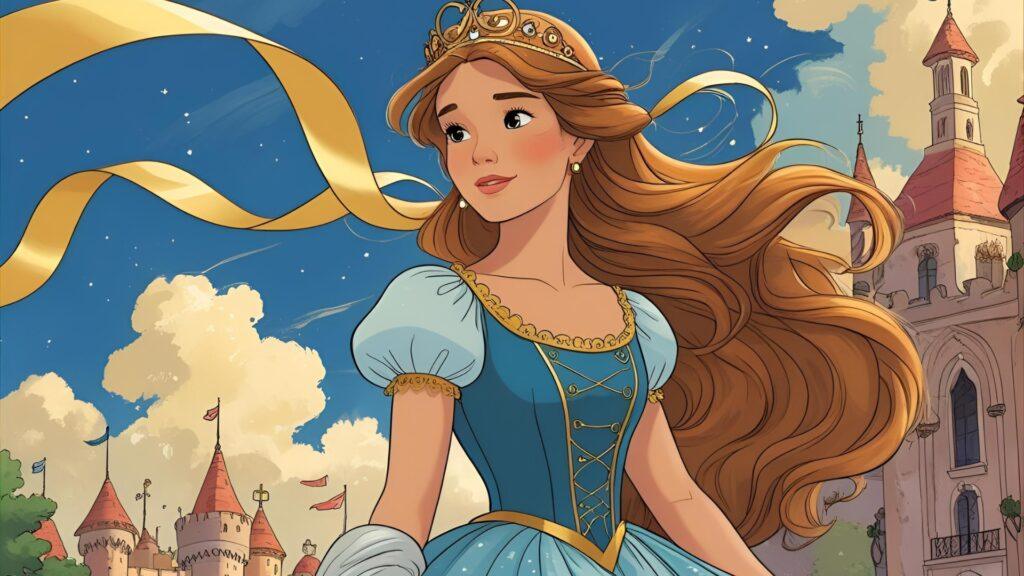
Anya wore the same green ribbon every day.
It wasn’t new. It wasn’t shiny or embroidered with gold like the ones in the palace shop.
It was soft, faded, and frayed at the ends.
But it mattered.
It had belonged to her mother.
Anya didn’t remember much about her. Just flickers. A lullaby in a low, warm voice. The way her arms felt like a whole world wrapping around you. The scent of rosemary and fresh bread.
And the ribbon.
Her mother had always worn it, tied loosely in her hair or looped gently around her wrist. When Anya was small, she’d grab at it while falling asleep in her lap.
After her mother passed, the ribbon was all she had left that truly felt like her.
So, she wore it.
Every day.
Braided into her dark curls or tied like a bracelet when her hair was too wild.
People didn’t ask about it anymore. At first, they did—maids, tutors, the tailor. But over time, they just let it be.
It was Anya’s thing.
One windy afternoon, she stepped into the garden to clear her head.
There had been another long, boring lesson on noble lineages. Another round of “sit straighter,” “speak clearer,” “don’t slouch.”
She had nodded and smiled, as always.
But her heart felt far away.
The wind was strong that day.
It danced through the garden like it was trying to stir up secrets. Leaves spun. Blossoms shook from branches. The sky overhead shifted with racing clouds.
And then—it happened.
The ribbon slipped from her braid.
One strong gust pulled it loose.
Anya reached for it, too slow.
It lifted into the air like a leaf—twisting, turning, floating.
“No—wait!”
She chased it.
Through the garden. Past the rose hedge. Down the hill behind the fountain.
The ribbon darted forward, carried by the wind, always just out of reach.
She ran faster.
Feet slipping on wet grass.
Heart thudding.
It meant too much to lose.
It was her.
It was her mother.
The wind tugged the ribbon into the woods.
Branches scratched her arms. Twigs caught her skirt. But she kept going.
Leaves crunched underfoot. Sunlight flickered between the trees.
The ribbon floated ahead like it was leading her somewhere.
She almost gave up.
Her legs ached. Her breath caught in her chest.
Tears prickled her eyes.
But then—
She saw it.
Caught gently on a tree branch.
Tied in a loose knot, like someone had carefully placed it there.
Anya froze.
She stepped closer.
The bark of the tree was smooth, old.
And carved into it—barely visible under moss and years—were five words:
“Where you go, I’ll follow.”
Her breath caught.
She stared.
Touched the words with trembling fingers.
The ribbon fluttered gently, like it was waiting for her.
She untied it, held it close, and turned around—
And he was there.
Standing a few steps behind her.
No sound. No warning. Just… presence.
He looked startled too. Like he hadn’t meant for her to see him yet.
They stared at each other.
And somehow—she knew.
It was him.
The gardener’s apprentice.
She had noticed him before.
Noticed how he hummed while pruning. How he tucked stray caterpillars onto safer leaves. How he always looked at the sky like it was telling him secrets.
But she had never spoken to him.
Not really.
Now, here he was. In the woods. With her ribbon.
He didn’t speak.
He didn’t have to.
His eyes said everything.
“I followed it too.”
“I didn’t mean to scare you.”
“I just… knew it mattered.”
She smiled.
A small, uncertain thing.
“I chased it,” she whispered, clutching the ribbon. “I thought I lost it.”
He nodded. Stepped closer.
“It wanted to be found,” he said softly. “Some things don’t get lost. They lead.”
She looked at the tree again. The carving.
“Did you… write that?”
He shook his head.
“No. It was already there. Maybe a long time ago. Maybe for someone else.”
He touched the bark gently. “But maybe also… for you.”
They stood in silence.
A wind moved through the trees again.
This time, it was softer. Like a sigh.
Anya looked down at the ribbon.
Then back at him.
“I don’t usually run,” she said.
“I don’t usually follow,” he said.
They both smiled.
Something warm settled between them. Not loud. Not sudden.
Just real.
She tied the ribbon back into her hair.
“Thank you,” she said.
He didn’t answer.
Just watched her with the kind of eyes that didn’t need to speak.
They walked back slowly.
Through the trees. Up the hill. Into the edges of the garden.
No one saw them.
No one asked.
But everything had changed.
After that, she saw him everywhere.
Not just working—but present.
Not just someone in the background—but there.
And he saw her too.
Not just the perfect posture. The polite smile.
But her.
The real Anya.
The girl who ran barefoot in the woods.
The girl who cried over old lullabies.
The girl who chased the wind for love.
They didn’t have a grand romance. Not right away.
It was small things.
A glance during breakfast deliveries.
A smile in the hallway.
A pressed flower left on a stone where she liked to sit.
A ribbon, tied to the branch of her favorite tree, just gently swaying.
Years later, when her world got bigger and harder, when palace life pulled her in new directions—
She’d still reach for the ribbon.
Still wear it.
Still remember.
And sometimes, when the wind picked up, and the leaves danced, and the world felt too loud—
She’d walk into the woods.
To the tree.
To the carved words.
And sometimes… he’d be there too.
No words.
Just her.
And him.
And the ribbon that never really got lost at all.
The Kingdom Beyond the River
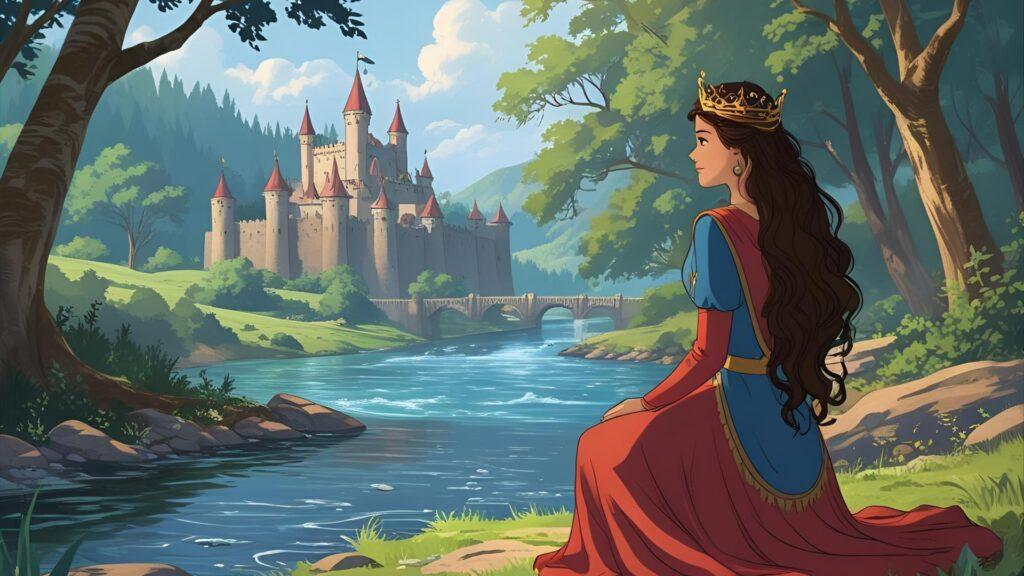
Everyone warned Lyra about the river.
“It’s too wild,” they said.
“It leads to nowhere,” others whispered.
“Nothing good ever came from the other side.”
She heard it all.
The warnings.
The stories.
The quiet fear behind people’s eyes when they spoke of it.
But Lyra never believed them.
Not because she was stubborn—though she was. And not because she thought she knew better—though sometimes, she did.
It was because, deep down, the river didn’t feel like danger.
It felt like a calling.
There was something about the way it curved through the land, cutting through forest and field like a silver thread. Something about how the mist rose from it at dawn, curling like a secret being whispered.
And at night, when the moon was full and the palace windows glowed faintly behind her, she’d stare out toward the water.
And wonder.
What was on the other side?
One night, she stopped wondering.
She decided.
She would go.
Not forever. Not to run away. Just to find out.
Just to see.
So, under a sky of stars and silence, she built a raft.
Not a grand thing.
Just a few strong planks, roped tightly, with a piece of fabric for a sail.
Big enough for one.
And quiet.
Everything had to be quiet.
She waited for the moon to rise high, casting soft light on the river’s surface.
Then she slipped out of the palace.
Down the grassy slope.
To the place where the river slowed just enough to welcome her.
She pushed the raft into the water.
Stepped aboard.
And let go.
The current took her gently.
Not like the stories.
Not crashing or dragging or spinning.
Just steady.
Sure.
The mist kissed her cheeks. The trees on the banks bowed in shadow. The stars above watched like guardians.
She didn’t feel afraid.
She felt alive.
She passed familiar landmarks—an old bridge, a broken statue half-buried in ivy.
Then new ones—twisting cliffs, glowing fungi at the water’s edge, a tree with blue leaves that shimmered as she drifted by.
Time felt different.
Slower.
Or maybe deeper.
She lost track of how long she had floated when she saw it.
Light.
Not the sharp flicker of fire.
But soft, warm lanterns.
Hundreds of them.
Dangling from trees, floating on the water, lighting a path through the mist.
And beyond them—
A town.
Small cottages with crooked roofs.
Gardens bursting with flowers.
Strings of bells and cloth hung between trees like festival ribbons.
People.
Laughing. Dancing. Sitting around fires and sharing stories.
Music drifted toward her—sweet and strange, like flutes made from reeds and drums shaped like hollow stones.
She reached the shore and stepped off the raft.
No one stared.
No one gasped or bowed or asked why a girl in royal slippers had floated out of the mist.
They just smiled.
Welcoming.
As if they’d been waiting.
At the edge of it all stood a boy.
Not much older than her.
Holding a cup of tea.
He handed it to her with both hands.
“We’ve been waiting for you,” he said.
Like he knew.
Like it wasn’t strange at all.
Lyra opened her mouth. Closed it again.
She took the tea.
Warm.
Fragrant.
Real.
She smiled.
“Are you real?” she asked.
He laughed.
“The most real things,” he said, “are the ones no one believes in.”
She stayed.
For hours.
Maybe longer.
Time bent in that place.
She danced barefoot on the mossy ground.
A little girl painted stars on her arm with blue ink.
An old man taught her a riddle she still can’t solve.
The boy with the tea—his name was Cael—walked beside her, pointing out little things.
A flower that only bloomed when you sang to it.
A tree that hummed when you leaned against its trunk.
A stream that ran in two directions at once.
Everything felt familiar.
Like she belonged.
Not as a princess.
Not as a perfect version of herself.
Just… Lyra.
That night, as the lanterns floated higher and the town gathered around a glowing pool to listen to a storyteller with silver eyes, Cael leaned closer.
“You’ll have to go back,” he said softly.
She didn’t want to.
But she knew.
It wasn’t running away if you returned with something new.
He touched her hand.
“When you’re ready, the river will know.”
So she stayed a little longer.
One more song.
One more story.
One more dance.
Then she returned to the shore.
Her raft was still there.
Untouched.
Waiting.
She stepped aboard.
Cael walked beside her until the water touched his boots.
He handed her a pouch.
“Tea leaves,” he said. “From the garden here. Brew them when you need to remember.”
She held it close.
He raised a hand.
She drifted away.
The mist wrapped around her again.
The current pulled her back.
The river carried her home.
When she stepped onto palace land, the sun was just beginning to rise.
She wasn’t sure how long she’d been gone.
But the grass felt familiar again.
So did the trees.
And her heart—
It felt whole.
She returned to her room quietly.
Washed her face.
Dressed for breakfast.
No one asked where she’d been.
Maybe they thought she was walking the gardens.
Maybe they didn’t want to know.
But something had changed.
She smiled more.
Listened better.
Her laugh had an edge of music to it now.
And sometimes—when she stood at the palace windows and looked toward the river—she’d see a flicker of lantern light.
Just one.
Blinking.
Waiting.
The Fox Who Kept Her Secret
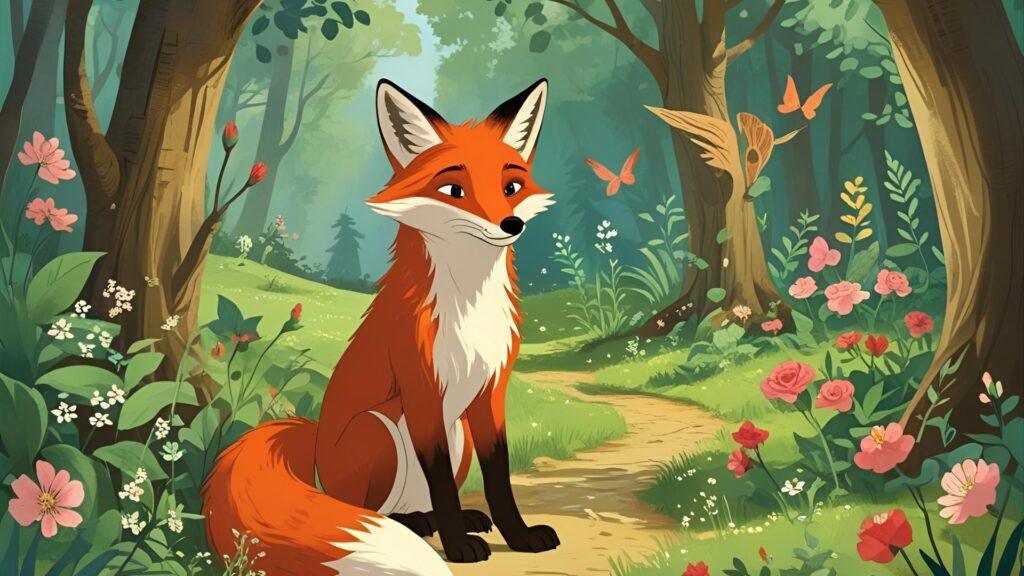
Isla didn’t talk much.
Not because she didn’t have things to say.
She just didn’t always know how to say them.
She was the quiet one in a noisy palace. The one who sat at the edges of gatherings, tracing invisible patterns on the tablecloth. The one who watched raindrops race down glass and picked the one she thought would win.
She felt… a lot.
She just kept it all inside.
People said she was shy.
Polite.
Sweet.
But no one ever asked her what she was holding in her heart.
Not really.
So Isla wandered.
When the palace got too loud, she slipped away—into the gardens, down winding stone paths, and eventually, into the woods.
There, the trees didn’t expect anything from her.
They didn’t ask her to speak up or smile wider.
They just let her be.
She loved the woods most in early morning, when the light was pale and sleepy. That’s when she first saw him.
The fox.
He was silver.
Not the usual rust-red kind she had read about in books.
His fur shimmered like moonlight on water. His eyes were deep, like they held whole forests inside them.
He didn’t run.
Didn’t hide.
Just sat.
Watching.
Isla stood frozen for a long moment.
Then, without knowing why, she sat down too.
They stayed like that.
Two quiet creatures.
Still. Soft.
Together.
She came back the next day.
He was there again.
Same place.
Same watchful eyes.
She brought an apple and placed it on the moss between them.
He didn’t touch it.
But he stayed.
Day after day, she returned.
She brought books, but didn’t read.
She brought snacks, but never ate much.
What she did bring—slowly, carefully—were words.
Hers.
“I don’t know how to be the way people want me to be,” she said one morning, voice barely louder than the wind.
The fox blinked.
She felt heard.
So she kept going.
“I get nervous when too many people are looking at me. I forget what I was going to say. Then I feel stupid.”
The fox tilted his head.
“But I like quiet things,” she said. “Like soft music. Blankets. Shadows.”
He didn’t move.
He just listened.
Over the days, she told him everything.
Not all at once.
But in bits and pieces, like letting out thread from a tangled spool.
“I miss my sister. She went to study far away. Everyone says I’ll go too. But I don’t want to.”
“I cried in the hallway once and hid in a cupboard for an hour so no one would see.”
“I write poems in the margins of my notebooks.”
“I wish someone knew the real me.”
Sometimes, she cried.
The fox never came closer.
But he never left.
One morning, she brought a blanket.
Laid it out on the soft moss near their spot.
Sat and let the silence stretch.
The fox curled his tail over his paws.
She smiled.
“You’re the only one I talk to like this,” she whispered. “Is that weird?”
The fox blinked once. Then twice.
She laughed.
A soft, real laugh.
It felt good.
She brought him small gifts.
A pebble shaped like a heart.
A pressed daisy.
A ribbon tied into a little bow.
He never took them.
But she left them anyway.
It felt like sharing pieces of herself without needing to explain.
Then one day—he was gone.
She arrived, carrying a slice of pear tucked in a napkin.
But the silver fox wasn’t there.
She waited.
Called out quietly.
Nothing.
Just wind.
Leaves.
Emptiness.
Her chest tightened.
Maybe he had moved on.
Maybe she had made it all up.
Maybe no one had really listened at all.
She stood to leave.
But then—she saw it.
On the moss where the fox always sat, there were tiny objects.
Three of them.
A smooth stone shaped like a heart.
A feather, pale and soft.
And a little scroll of bark, tied with a bit of vine.
She picked it up, hands trembling.
Unrolled it carefully.
On the inside, written in neat, looping letters, were five words:
“I hear you. You’re safe.”
She gasped.
Pressed it to her chest.
Tears spilled over, but they weren’t from sadness.
They were from being seen.
Really, deeply seen.
She looked around, half-hoping he might still be near.
But the woods were still.
And kind.
She knelt, arranged the stone and feather carefully, and placed a sprig of lavender beside them.
“Thank you,” she whispered.
From then on, she wore the little scroll tied on a thread around her neck.
Close to her heart.
She still visited the woods.
Not every day.
But enough.
She sat in their spot, breathed in the silence, and let herself feel.
She didn’t always speak out loud.
Sometimes she just let the breeze carry her thoughts.
She started writing more.
In journals.
On scraps of paper.
Little stories. Secret hopes. Fears she used to bury.
And slowly, slowly… she began sharing them.
With people.
One friend at first.
Then another.
Not everyone understood.
But some did.
And that was enough.
Years later, when people spoke of Isla, they called her “kind.”
“Thoughtful.”
“Gentle.”
What they didn’t know was that she had been all those things all along.
She had just needed someone to hear her.
Someone to let her be quiet and still and full of feeling.
Someone like a silver fox.
And though she never saw him again…
Sometimes, when the wind shifted and the trees leaned just so—
She swore she felt him near.
Listening still.
The Princess and the Sky Quilt

Neve loved the stars.
More than books. More than birthday cakes. More than her silk slippers or her crown.
At night, when the palace grew quiet and the fires dimmed, she would slip out onto her balcony and lie on a pile of pillows and blankets, staring up at the sky.
She tried to count the stars.
She always lost track.
But she didn’t mind.
Some sparkled like mischief. Some blinked like shy secrets. Some looked like they were dancing.
It made her feel small—but not in a scary way. More like she belonged to something big and beautiful.
Her grandmother once told her a story.
Neve had been very young—maybe five. She had just woken from a bad dream.
The sky had been cloudy, and she cried, thinking the stars were gone forever.
Her grandmother wrapped her in a shawl, pulled her close, and whispered:
“Don’t worry, little light. The stars don’t go away. They just sleep under the sky’s quilt during the day.”
Neve had blinked.
“The sky has a quilt?”
Her grandmother smiled. “Of course. It’s stitched with clouds and dyed with light. That’s what keeps the stars warm until it’s time to shine again.”
That idea stayed with her.
Long after her grandmother passed, long after the stories stopped, Neve remembered.
So when she turned twelve and the palace tailor offered to sew her a new gown for the spring ball, she made an unusual request.
“Can I have cloth scraps instead?”
The tailor blinked.
“Scraps?”
Neve nodded. “All your leftover pieces. Any colors. Any textures. Everything.”
The tailor didn’t argue. She had known Neve since she was small and trusted her odd little heart.
So, she gave her a basket full of scraps.
Neve started that night.
She didn’t know much about sewing.
Her stitches were crooked. The pieces clashed. Nothing was straight or even.
But she kept going.
Each piece meant something.
A bit of blue silk from her baby blanket.
A ruffle from the edge of her old curtain.
A square of cloud-colored fabric that looked like the morning sky.
She added buttons shaped like moons. Beads that shimmered like stars. A ribbon that once tied her hair the day she made her first real friend.
Each stitch, each patch, was a memory.
She didn’t tell anyone what she was making.
She worked on it only at night, with a small candle beside her and the stars above.
It was slow.
Careful.
Quiet.
But she loved it.
It became her own kind of magic.
When it was big enough, she slept under it.
It wasn’t perfect.
It was lumpy in places, scratchy in others. One edge was shorter than the rest.
But it felt like hers.
And when she lay beneath it and looked up at the real stars, she imagined they were smiling back.
One morning, after a night of heavy wind, she woke to find her quilt… gone.
Gone.
Not folded.
Not tucked away.
Just—gone.
The wind must have taken it.
She searched the balcony.
The halls.
Even the trees outside.
Nothing.
Her heart dropped.
She cried for the first time in a long while.
Not loud sobs—just silent tears that slid down and soaked into her pillow.
She had worked so hard.
Put so much of herself into every patch.
It wasn’t just a blanket. It was her story.
And now it was floating somewhere, alone.
That night, she couldn’t sleep.
She didn’t go to the balcony.
She didn’t look at the stars.
It hurt too much.
The next night, she still didn’t go.
But on the third night—something changed.
She lay in bed, staring at the ceiling, when a flicker of light caught her eye.
She sat up.
Then stood.
Then opened her balcony door slowly.
And gasped.
The stars… were brighter.
Not just a little.
A lot.
They sparkled like fireworks frozen in place.
They shimmered and pulsed, like they were wrapped in something soft and glowing.
She stepped outside, bare feet cold against the stone.
The air was still. No wind. No clouds.
Just stars.
And in them, she swore she saw pieces of her quilt.
A silver button.
A ribbon drifting.
A patch of purple cloth she’d sewn from her curtain.
The stars… were wearing it.
Her quilt.
Her sky quilt.
Wrapped around the night like a hug.
She didn’t speak.
She just smiled.
Wide.
Real.
The kind of smile that starts in your chest and climbs to your eyes.
The next morning, she found something on her balcony railing.
Folded neatly.
A single patch from her quilt.
The one shaped like a tiny star.
Tied to it was a ribbon.
And on the ribbon, a note.
Only three words.
“We felt it.”
No name.
No signature.
Just that.
She didn’t need anything else.
She pressed the patch to her cheek.
Held it close.
Then stitched it onto a new piece of fabric.
And began again.
That spring, she started teaching others how to sew their own sky quilts.
She called it memory stitching.
“Choose a piece for every feeling,” she told them. “Every hope. Every love. Every tear.”
The other kids didn’t laugh.
They liked it.
They brought their scraps and made odd-shaped quilts of their own.
Soon, the palace was full of sky quilts.
On beds.
On chairs.
Hanging from balconies.
Each one a story.
Each one stitched with care.
Neve kept sewing.
Each night under the stars.
And every so often, when the wind picked up just right, she let one go.
Tied a ribbon.
Wrote a note.
And let it drift.
To the sky.
To whoever might need it most.
Because somewhere out there, maybe someone else was looking up—
And needed a little warmth.
Why Princess Stories Work So Well?
Princess stories work because they make us feel special. When you tell your girlfriend a story where she’s the princess, it’s not just sweet—it’s a way to show love in the simplest, gentlest way.
They’re kind of timeless
Whether it’s Disney or something totally made up, princess stories have this warm, romantic feel to them. There’s always hope, kindness, maybe a little adventure… and a happy ending.
They pull you both in
You’re not just telling her a story—you’re inviting her into it. You both get to step away from real life for a few minutes and imagine something magical together.
They feel personal
When you change things in the story—like the setting, or the way the princess acts—it shows her you see her. You’re not just telling a story, you’re telling her story in a sweet, dreamy way.
What Makes a Princess Story Really Work?
What makes a princess story really work? It’s not castles or dragons. It’s the feeling. A story that makes her smile, feel loved, and feel like the most important person in the world—that’s the magic.
The princess should feel real
Let her be brave, or curious, or even a little unsure. She doesn’t need to be perfect—just human.
The setting should feel dreamy
Maybe it’s a cottage by the sea, a kingdom in the clouds, or a glowing forest. Just pick something that feels magical and warm.
Keep the problem simple.
It doesn’t need to be a dragon. Maybe she lost a locket, or the stars stopped glowing, or a bird needs help getting home.
End it with heart
The best endings leave you both smiling. Maybe she finds the courage she didn’t know she had. Maybe her kindness changes everything. Maybe the stars shine again—because of her.
What’s the Story About?
Need a little help picking the theme? Try one of these:
- Adventure – She follows a glowing trail through the woods and finds a secret garden.
- Courage – She walks into the forest even though it scares her… and comes out stronger.
- Friendship or love – She meets a talking animal or a traveler and they help each other grow.
- Magic – A mirror that whispers secrets. A lantern that only lights up when someone tells the truth.
You don’t have to overthink it. Just pick one that feels right. Or mix a couple together and see where it goes.
How to Make It Her Story
Want to make the story really special? Make it hers. Use her name, her favorite things, little moments you both share. When it feels personal, even the simplest princess story becomes something she’ll never forget.
Use little things she loves
If she loves roses, maybe the path to the castle is lined with them. If she loves the ocean, make the kingdom sit beside a glowing sea.
Use your own memories
Did you go on a picnic once and find a green ribbon? Use that. Maybe the princess wears it. Maybe the fox in the story gives it to her. Small things like that make her smile.
Match the mood
If she had a rough day, tell a slow, comforting story. If she’s giggly and playful, make the story fun and silly. You know her vibe—go with it.
Keep it natural
You don’t have to sound like Shakespeare. Talk like you. Use words that come easy. Call her “my dreamer” or “my brave one” if it feels right. Say what you mean.
How to Start and Structure It
Starting a story can be simple. Just begin with her as the princess. Add a little adventure, a bit of love, and end with something sweet. There’s no right way—just your way.
- Start with a hook: “On the night the stars fell like rain, a quiet kingdom held its breath…”
- Introducing her world: Where does the princess live? What’s she like? What does she dream about?
- Add a small quest: Maybe something’s missing. Or something strange is happening. Keep it light, but give her something to figure out.
- Let her grow: Let her make a brave choice or show kindness that changes everything.
- Wrap it with warmth: Tie it back to her. Or to you two. “And from that night on, the skies sparkled brighter—just like her laughter does for me every single day.”
Telling the Story Out Loud
Telling the story out loud makes it more special. It’s your voice, her listening, and a moment just for the two of you. Simple words can feel like magic when they come from you.
Speak gently
You don’t need a big “storyteller voice.” Just speak softly. Let the story unfold like a lullaby.
Pause sometimes
A little pause after “And then…” goes a long way. It builds suspense. It makes her curious.
Ask her questions
“Can you picture the castle?” or “What would you name the fox?” It makes the story feel like something you’re both part of.
Set the scene
Play soft music. Light a candle. Or just hold her hand while you talk. Simple things make it feel cozy and close.
Make It Last
A good story ends, but the feeling can stay. To make it last, keep telling little stories, keep making her smile, and remind her often that she’s your princess—even after the lights go out.
Leave a little surprise
You could press a flower from the story into a book. Or write a tiny love note with one line from the story.
Talk about it later
Ask her which part she liked. It’ll make her feel seen—and give you ideas for next time.
Turn it into a thing
One story becomes two. Two becomes ten. Soon, you’ve got your own bedtime story tradition—and it’s yours alone.
One Last Thing
This doesn’t need to be perfect. You’re not trying to win an award. You’re just trying to give her a soft moment at the end of the day.
You’re showing her that you care. That you pay attention. That you’re willing to be a little silly, a little dreamy, just to make her smile before sleep.
So tonight—pick a theme. Add a small touch she’ll recognize. Say it out loud.
Because the best fairy tales aren’t in books. They’re told in the dark, between two people who love each other.
And yours? It starts tonight.
Mark Richards is the creative mind behind Classica FM, a podcast platform that brings stories, knowledge, and inspiration to listeners of all ages. With a passion for storytelling and a love for diverse topics, he curates engaging content—from kids’ tales to thought-provoking discussions for young adults.



